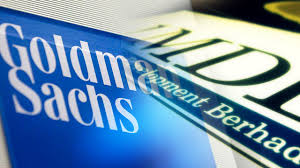Goldman Sachs Pleads Guilty to 1MDB Scandal and Pays $2.9B Fine
Alyssa Mar
Trending Writer

Last Thursday, Goldman Sachs Group, Inc. agreed to pay a $2.9B fine to regulators for raising funds for 1Malaysia Development Berhad (1MDB), a Malaysian sovereign wealth fund tied to multiple cases of fraud and corruption. Dubbed as “one of the biggest financial scams in history,” the United States Department of Justice (DOJ) has led one of the world’s largest investment firms to plead guilty after further investigations ensued.
In 2012 and 2013, Goldman Sachs’ Malaysian unit helped raise $6.5B for 1MDB by selling bonds to investors. According to Malaysian and U.S. authorities, $4.5B was stolen from 1MDB in an elaborate scheme to benefit high-level officials, such as former Malaysian Prime Minister and Founder of 1MDB, Najib Razak. Most of the funds were stolen by a Malaysian businessman, Jho Low, who is believed to be in hiding in China. The culprits utilized these funds for their leisure, including purchasing real estate, hotels, private jets, and other luxury assets—some even financed Hollywood films.
Court documents also confirm that the arrangement of the $6.5B bond offerings to 1MDB was approved by two former Goldman Sachs bankers and associates, Tim Leissner and Roger Ng, in the Malaysian and Emirati governments. Consequentially, Leissner has pleaded guilty to multiple DOJ charges concerning money laundering. His partner, Ng, is maintaining his innocence and is expected to appear in court in March 2021 to testify. Furthermore, the Malaysian High Court has convicted Razak guilty as multiple traces of evidence lead to actions of money laundering on his part. Still, the former Malaysian prime minister has pleaded innocent of charges, and future trials are expected to take place.
Per the U.S. DOJ, Goldman Sachs violated the U.S. Foreign Corrupt Practices Act, which bans U.S. companies from paying foreign government officials for help in maintaining the business. The DOJ sought to recover $2.1B of assets linked to the 1MDB funds – the largest ever asset recovery brought by the agency. However, Malaysian authorities continue to reassert that more than $4.3B is still unaccounted for.
After several years of battling this controversy, Goldman Sachs has publicly admitted their wrongdoings per the U.S. DOJ’s orders. As a disciplinary action from their Board of Directors, the CEO, COO and CFO, as well as the current CEO of Goldman Sachs International, have had their “overall compensation reduced by $31M for 2020.” Additionally, these cuts have been applied to former officers and retired firm executives as repercussions for “not overseeing bankers.” In total, these compensation reductions will total “approximately $174 million in the aggregate.”
Since the rise of this controversy, Goldman Sachs has reflected on their actions and has established further steps to enhance internal and external compliance controls. In their press release following the announcement from the U.S. DOJ, these enhancements include “expanding the global compliance division, establishing an enhanced framework for addressing potential reputation risks, improving anti-bribery controls, and creating new programs to investigate and prevent risks and potentially harmful actions.” Goldman Sachs will also initiate a select committee of the Board of Directors to oversee remediation efforts arising out of lessons of 1MDB.
The damage to the brand of a prestigious investment bank and the faith of investors has taken a huge toll. Nonetheless, Goldman’s current CEO, David Solomon, has attempted to compensate for the firm’s inadequacies and emphasize their growth by saying, “We are not putting the lessons learned from this experience behind us. When a colleague knowingly violates a firm policy, or much worse, the law, we – as a firm – have to accept responsibility and recognize the broader failure that individual behavior represents for our firm.”
Contact Alyssa at maralyss@shu.edu
